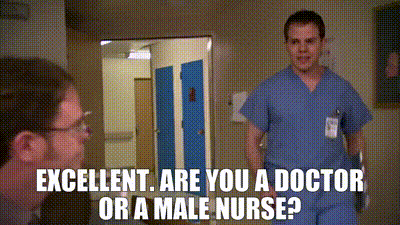What's the traditional gender for a job?
Gender flight — when the dominance of one gender (negatively) impacts how the whole field is perceived.
Isn’t that like a woman’s job? [Derogatory.]
I can’t remember where I’ve heard this, but I know I’ve definitely thought it in my youth when I’d seen a man in a profession that I associated with being a woman’s.
This is interesting, because historically, women have not worked (in the formal/recognized) way as long as men have. Professions, careers, and promotions were words only applied to men.
Over time, we've created demarcated male & female jobs. Not just work, we've also got gender-specific areas of study.
It got me thinking: How did one gender dominate XYZ field? Turns out, these areas of study or work have a direct relation to how a profession is perceived by the general population (and also the pay that people get).
And this, in turn, is because of a phenomenon called 'gender flight.'
How does the 'easiness' of a job affect who does it?
Gender flight is (quite obviously) the gendered version of ‘white flight.’
__________ flight “refers to the demographic shift of a particular group away from an area or environment where another group is becoming increasingly dominant.”
In the 1950s & 60s, in the US, a lot of white people left spaces that were becoming dominated by Black people or other POC. Subsequently, those areas' property rates, development progress, school funding, etc., were reduced.
Now, we're seeing a similar phenomenon happen within gender. Biology, often considered one of the "easier" STEM subjects, is an excellent example of recent gender flight.
Of undergraduate biology majors, more than 60 percent are female, and about half of the biosciences graduate students are women.
Like Biology, previously male-dominated areas of study and professions experiencing an influx of women now have the reputation of being 'easy to get into' or 'not that difficult to do.' Considering what we know about the wage gap and general limitations the non-male folks experience, it's no surprise that this demographic change has led to a reduction in pay and respect as men move out of these professions.
Back in 1994, a study was done on this phenomenon. The hypothesis asked:
Does the sustained entry of significant numbers of women into an occupation precipitate a decline in the status of that occupation?
They examined the "feminization" of the work force within computer work and didn't find it true. However, 30 years on, we see real & anecdotal evidence that once a field has more women, men are less likely to enter it — and if they do, they might still get paid more.
In recent memory, gender flight is commonly seen in professions like:
Nursing
Interior Design & Architecture
Education
When men dominated these professions, they were highly respected and paid fairly. Now, as more and more women become teachers, architects or nurses, these professions have become synonymous with "female" jobs that don't pay well or have good career growth opportunities.
The reel that sparked my interest in gender flight, by an architect herself, points out how there are now added levels to gatekeep people (mostly women) from the "higher levels" of a profession that women dominate. For example, licensure — an additional requirement to get more pay — has been added to being an architect. Interior design as a field is dominated by women right now, but not at the highest levels.
89.9% of people in America with an Interior Design degree are female.
[But] 67% of large interior design firms’ partners or principles are, nevertheless, still men, which tells us in no uncertain terms that visibility has not yet translated into wide-scale control for female interior designers.
A common feature of gender flight is also that men, despite numbering among the few in that profession, have higher visibility, more power, and make more money.
When it comes to another female-dominated field like nursing, we can see the situation can get worse when there’s an overlap between gender flight & white flight.
There have been strides to close the gender pay gap in nursing. It has narrowed in recent years but disparities still exist, especially among nurses who identify as Black, Indigenous, and people of color (BIPOC). Men represent about 13% of the overall nursing profession. However, registered nurses (RNs) identifying as male reported a median salary of $90,000 vs $76,000 for RNs who identified as female—a $14,000 gap in earnings, according to the 2022 Nurse Salary Research Report.
The role of care-giving within women's professions
Several of these (now) female-dominated professions are pink-collar in nature —
Pink-collar workers like teachers, healthcare workers (especially nurses), and home aides have been grossly underpaid and mistreated for decades worldwide. Pink-collar work refers to care-oriented work that historically has been done by women. It’s also an excuse to underpay these professions as they’re considered “supplementary jobs”
All over the world, women are generally encouraged to choose professions that will not interfere with their ‘home lives.’ This means selecting professions that allow them to manage a home (their kids, general upkeep, etc.), and a simple, no-stress, no-frills career is the best way forward. So professions like interior design or education are considered hobbies or fun (engaging?) things to do in your free time while the kids are at school are heavily encouraged.
Conversely, men are encouraged to pursue engineering or become doctors and lawyers, really laying into the STEM and powerful position of it all. This cements their positions as breadwinners of the family. Plus, entering female-dominated positions is often considered a threat to their masculinity.
After all, there are so, so many jokes where the punchline is a male nurse or a female doctor who’s mistaken for a nurse.
For example, nursing is so heavily female-coded that when a man works as a nurse, he is often called a "male nurse" rather than just a "nurse."
Let's be clear: women entering previously male-dominated professions is a win. It means we've carved a space and really worked hard to keep it going for at least a few generations. But it's annoying that the more women enter a profession, the fewer men decide to — because this, in turn, contributes to the wage gap and the way the general public views these professions.
My wise friend Mai perfectly encapsulates it:
"It sucks that our society would rather ruin a whole field of work rather than pay women an equal amount of money."
To be honest, it's not a win-win scenario. Women get paid less, and men can't choose that profession anymore without being ridiculed. It's just baby steps in a direction yet to be paved properly.
What did you think of this issue?
Your anonymous feedback helps me improve. Thanks!
Nia's note:
It’s my birthday today!!🎉
If you've been enjoying this newsletter, there's no better day to give me a little boost in the form of a coffee or a little online share! This is a labour of love, and while I'm super passionate about writing this newsletter, every comment, share, reader, and coffee encourages me further. 🖤
Stuff I wanna share with you today 💥
Woolly mammoths were around when the pyramids were being built.
The vibe I'm taking into my next year on earth:
Thanks for reading! Please hit the heart below or drop a comment if you liked it (helps more people find this newsletter + gives me a serotonin boost). 🖤







Happy birthday Nia. Hope this year is a fantastic one for you
Hey, happy birthday to you!